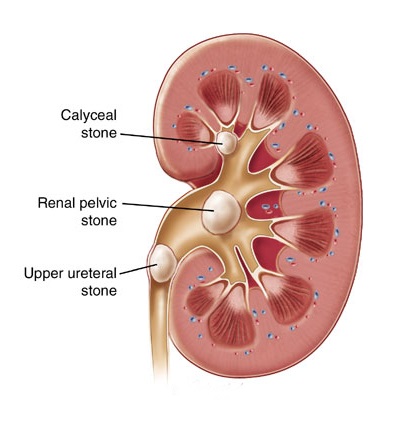The kidneys are one of the most important organs of the human body. They filter out toxins and other harmful elements from the blood and remove those from the body as urine. Without the kidneys or if the kidneys malfunction, these harmful elements can build up and destroy the rest of the body’s organs, such as the heart, liver, and even the brain.
Majority of the waste products the kidneys filter from the blood are made of minerals and salt. Unfortunately, these waste products can sometimes build up in the kidneys as well. When they do, they form kidney stones. These stones are crystal formations that usually start off small, but in time they can get larger.
The different types of kidney stones
Most kidney stones are made of calcium and are referred to as calcium stones. Around 80% of people with kidney stones have calcium stones. Kidney stones can also be made up of uric acid. People who have high levels of uric acid in the blood are at risk of developing these types stones. However, only about 10% of kidney stone cases are caused by uric acid.
Other rare cases of kidney stones are struvite stones caused by a urinary tract infection and cystine stones that are amino acids. Cystine stones are caused by a rare metabolic disorder. Amino acids are supposed to be reabsorbed by the body as these are important elements. When the body fails to reabsorb it and cystine continues to build up in the kidneys, they can form cystine kidney stones.
What causes kidney stones?
The most common cause of kidney stones is a person’s diet. You may be thinking that since most kidney stones are made of calcium, then a diet high in calcium could be a risk factor. However, studies have shown that eating a high-calcium diet is not a risk factor. The main reason why calcium stones form is because of high levels of salt. Instead of lowering calcium intake in people with calcium kidney stones, doctors will advice the patient to lower consumption of salt.
Another major cause of kidney stones is dehydration. When a person lacks fluids in the body, the kidneys have trouble processing urine. The low volume of urine means that minerals are likely to build up in the kidneys, thus forming kidney stones.
Studies have also shown that certain medications and food supplements can also cause the formation of kidney stones. However, since medications are important for the body in certain situations, it would be unsafe to stop taking medications. It would be better to talk to your doctor if you experience any symptoms of kidney stones. Do not stop taking the medications unless you have approval from your doctor.
People with a family history of kidney stones are at a higher risk of developing this condition themselves. If your parents or siblings experienced this condition, then there’s a good chance that you could develop it as well. Fortunately, kidney stones can be prevented so if you take the necessary precaution, your risk of developing this condition significantly reduces even if you have a family history of kidney stones.
